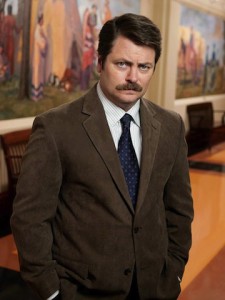Editor’s Note: This lighthearted reflection on Parks and Recreation was written by our dear friend peripherally associated contributor Ron Swanson, the outspoken libertarian former director of the Department of Parks and Recreation in Pawnee, Indiana. Mr. Swanson was grateful enough to provide us an advance copy. Spoilers abound.
Mr. Swanson: I have thoroughly enjoyed my time on Parks and Recreation, if not my time working for the local government. It has been an ordeal, but I have come to terms with my fate of being involved in the public sector, and the federal government no less.
I appreciate it when local officials do absolutely nothing all day. Since the beginning, I have always advocated making government as inefficient and ineffectual as possible. Consider this my contribution to bringing down our entire oppressive system crumbling to the ground. As Superintendent of Pawnee National Park I can stand around outside, drinking Lagavulin in my canoe, while doing nothing else.
I have always advocated for killing things in nature rather than staring at or creating what has been called “art,” and I get to live that every day of my life now. My new workplace proximity associates treat each other with respect and fairness, per my specifications. Best of all, they leave me the hell alone, and after more than a decade I still know none of their names.
Despite fundamental disagreements with one Leslie Knope on virtually every policy matter, one cannot help but appreciate her relentless drive, painfully infectious enthusiasm, love of breakfast food, and ability to intimidate senior U.S. Senators. Seriously. Even John McCain is terrified of her. I am happy for her career success, but I do worry about the direction of our country. God help us all, now that she is President of the United States. I just care about this country so damn much and cannot bear to see it brought down by a big government liberal. Perhaps it is time to buy more gold. We shall see.
Either way, Leslie can now be counted as one of my three friends, being now more than a workplace proximity associate. She ultimately dealt with the unfortunate Morningstar incident with exceptional humility and grace. However, I am not sure if she will make the cut the next time I reconsider my social circle. Three friends are more than sufficient, and government officials are not high on that list.
But despite Leslie’s omnipresent rambling about the “good” that government can do through bureaucratic means, Parks still represents something inspiring and uniquely American. Many of my former workplace proximity associates have become successful in the private sector, a fact that makes me immensely happy.
Tom Haverford, in typical capitalist fashion, turned his entrepreneurial failures into a successful series of books. Kind of like how Donald Trump went bankrupt several times and started a reality show, except with even more flash. Donna Meagle’s nonprofit, in particular, demonstrates that we do not need the government to create a welfare state. The private sector handles that just fine. In addition, April Ludgate-Dwyer is now at the American Service Foundation, where she helps people find appropriate employment. Thus, she plays the laudable role of coordinating resources in a market economy and helps people get off the couch and actually contribute to society. And Andy Dwyer is, well, still Andy.
I am even happy with how Garry Gergich turned out, despite the fact that he remained in government work. I always enjoyed Garry as a workplace proximity associate. He is my ideal for what a government official should be like. His general incompetence, bumbling nature, and inability to get anything done should be the ideal for government officials around the country. If all government officials were Garry, government would be so ineffective that it could not take away our freedoms no matter how much it wanted to.
After leaving the company I founded, Very Good Building and Development (a name that crucially conveys quality without being flashy), I was uncertain as to what I would do. Many of my former workplace proximity associates had left Pawnee. While I recognized the value of and enjoyed entrepreneurship and job creation, I determined that I wanted to pursue greater meaning in my life. After all, this is still America. I am free to do so. Ultimately, I am just a modest and simple man who got everything that he wanted: Lagavulin and a national park.
Although the beginning was uncertain and unsteady, Parks soon grew confident and sure of itself. Parks was successful because it did not half-ass two things. It whole-assed one thing. It always gave 100 percent, but never 110 percent, which would have been impossible. It remained true to itself as it flung my frien—workplace proximity associates—into the future and across the country. We could not but help see that a show so full of heart, optimism, and rugged individualism succeeded. With a picture perfect ending, the now revered Parks signs off after an immensely successful seven year run. I have always maintained that crying is only acceptable at funerals, such as Li’l Sebastian’s, and at the Grand Canyon. Thus, I am definitely not crying as I am writing this. No, sir, I am not. Good bye. Mr. Swanson is Superintendent of Pawnee National Park, the majority stakeholder of Lagavulin distillery, and a contributor to The Dartmouth Review.


Be the first to comment on "Parks and Recreation: A Good Run"